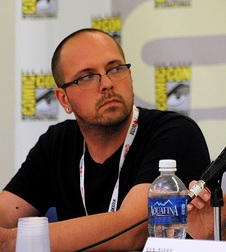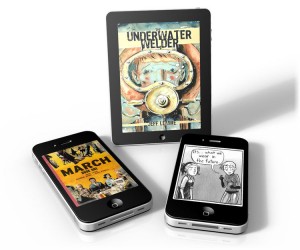By Bruce Lidl
Indie comics publisher Top Shelf announced yesterday that they will be selling a selection of their digital titles, without any DRM copy protection technology. Joining Image in the trend away from DRM on comics, Top Shelf will now offer eleven graphic novels from their own website in a variety of open formats, including PDF, EPUB and CBZ (essentially ZIP). The selected titles include the groundbreaking March: Book One, The Underwater Welder and a personal favorite of mine, God is Disappointed in You. Despite some slightly overzealous reports to the contrary, the rest of Top Shelf’s digital catalog titles, including standouts like From Hell or Essex County, remain available exclusively from retail partners comiXology, iBooks, Nook, Kindle, Kobo and iVerse, with DRM intact.
Top Shelf is also innovating by bundling print and digital versions together, by offering customers steep discounts for these eleven digital graphic novels if they purchase a print copy at the same time. March: Book One costs $14.95 for the print version, but you can get a digital copy as well for just $1.99, five dollars off the normal digital price of $7.99. The Surrogates: Volume One breaks down at $19.95 for print, $5.99 for digital, or $21.94 for both if purchased at the same time.
Chris Ross, Director of Digital Publishing, and Lead Designer at Top Shelf was very kind to answer some questions I had about their new initiatives and how he sees the digital trends progressing in comics.
Bruce: At San Diego, you corrected me to point out that Top Shelf had already done some DRM-free releases, even before Image’s big announcement, that had not gotten much attention necessarily. I spoke with Eric Stephenson at ImageCon in January, and they were not releasing data on their digital initiatives yet because they felt it was incomplete. Do you guys feel you were able to learn from your previous DRM-free experiments? What kinds of things have you observed that may have led to this new announcement?
Chris: We noticed a few things—in fact I discussed some of them in the letters page of Double Barrel #12. We here’s what we noticed:
DRM is not a “value-add” for the most part when it comes to selling digital content (at least compared to sales on other value-added platforms). For instance, ComiXology leverages Guided View and a great app, iBooks leverages a different interface and seamless device pairing. DRM choice didn’t affect these and we noticed no discernible or statistically significant changes when we went DRM free for DoubleBarrel—that is DRM-free didn’t hurt our sales through existing channels and was a nice added bonus to folks that only shop DRM-free. But there was some interesting data that suggested it was worth a try, namely a core group of people that would buy DRM-free to support it, to give it a try, or don’t use existing mainstream sources. I’d like to see what’s there.
The second thing we were interested in was trying to pair digital sales to physical sales. We had started talks internally about how to best go through with doing ebook/pbook bundles, but we needed to talk through the DRM-free component and really do it correctly before doing digital-physical bundles—Amazon MatchBook beat us to market, but reenforced that direction might be an interesting one to take.
The third thing I was VERY surprised about: we make DRM-free digital comics available in 3 formats (PDF, ePub, and CBZ), and the most popular format (so far) is ePub. That really surprised me.
Bruce: Dark Horse runs their own digital store, and highlights the flexibility it affords them on pricing and discounting. They also highly value the data that they control, as opposed to relying on partners to provide for them. Did either of those factors (pricing, data) play into this move?
Chris: The goal of Top Shelf’s digital program was to make sure that it started making money and was self-supporting as quickly as possible—if we had a larger IT budget to support a staff of digital workers and massive app development, I’d have loved to explore Dark Horse’s option for those same reasons (looking at customer data and make data-driven choices based on those). That being said, the crown jewel of our digital program has been the amazing relationships we’ve formed with our digital partners, and I think going 100% independent would have meant missing out on those partnerships. What I hope we can have going forward is the best of both worlds.
Bruce: In the press release you emphasize that many customers want both print and digital, and you are offering discounts for purchasing both at same time. Is that based on any specific feedback/data you’ve seen/heard? Is it a one-time discount offer? Can somebody come back later and get a discount on the digital version from a previous purchase of the print?
Chris: We’ve always believed that digital and print go together and can feed one another—we price that way, we make partnerships with that in mind, and we publish with that in the back of our minds. So these print/digital packages are something we’re very excited about. It’s a new program, and we’re curious to see what the reaction will be. I think that when you’re ordering a book, to be able to toss in a few extra dollars to get an instant download is a pretty sweet convenience.
Think about what it means for birthdays and Christmas presents – you can order the book to be shipped to a friend, reward yourself with the digital comic, and then when your friend receives the gift, you’ve already read it and are ready to talk about it!
Bruce: Monkeybrain has had noted success with a digital first, print second strategy. Is that something you are considering at Top Shelf?
Chris: We actually have for the last few years explored that very same option—LOST DOGS by Jeff Lemire was a digital-first comic. STUFF ABOUT SEX by David Mellon was a digital-first that just recently came out in print. MOTORCYCLE SAMURAI and WHAT AM I GOING TO DO WITHOUT YOU? are great digital comics that are eventually heading to print. And we’ve had some really interesting feedback from folks about it—namely that it really doesn’t change or hurt physical sales to digitally release a book first.
Bruce: comiXology has been quite vocal about DRM as a value add, as enabling a cloud experience for reading digital comics that is preferable to managing one’s own files. Your customers will now have a choice for their digital comics, but to take advantage of the discount they will have to purchase directly from the Top Shelf store. Those new digital graphic novels will now exist outside of their previous purchase eco-systems, whether they are comiXology or iBooks or Kindle. Are you worried about fragmentation for readers or do you see a trend towards readers self-managing their digital titles among retail systems? Does the lack of DRM make this more possible for customers?
Chris: I think there’s a few things in this question that should be parsed out a bit, but they are related.
First, I agree with comiXology’s assessment that their platform’s value add doesn’t compete with DRM-free/customer-side curated content. And many platforms have their own value-add’s—comiXology’s value adds include Guided View, a passionate community, and their talent—they have some amazing people working there. Amazon’s is curation and footprint, to an extent (not at the same level as brick and mortar, but it’s getting better everyday) and pricing. Apple’s is the iTunes ecosystem, Kobo’s is their relationship to brick and mortar stores and their pursuit of secondary markets, B&N’s is their brick and mortar presence, Overdrive’s is their relationship to libraries, etc. All of these have interesting value add’s for customers to consider. I prefer certain platforms to others for different kinds of reading experiences, so I think it’s ok for some fragmentation to happen. It lends a bit of experimentation to customer’s options, to see how it works for them. I don’t think store value-adds will promote fragmentation—I think the lack of an ebook standard for comics and graphic novels promotes fragmentation; an ebook standard that makes publishers and ebook professionals gnash their teeth and pull their hair out causes fragmentation.
As a publisher, we aren’t really interested in voting for one retailer or platform vs another. We see our role as making sure you can read our authors’ work in high-quality editions regardless of format.
Bruce: How did you choose the titles for this initiative? Subject matter? Audience? Existing contracts for distribution rights? Were the creators comfortable with DRM free or did they have concerns? Are they, and/or Top Shelf, concerned with the pirating of their work?
Chris: There were a few things that went into our decision to pick these specific books. If offering Top Shelf books DRM-free is an experiment, I wanted to start with a few authors who were enthusiastic about trying something new. Second, they had to be popular books, a mix of recent releases and active backlist. Third, the content should lend itself to be DRM-free. All of the creators were actively for it (although in a few cases they needed to have DRM explained).
Here’s a funny story: I was looking at a pirate website entry for THE UNDERWATER WELDER. It was a CBZ of it, scraped from the internal asset files of a legitimately purchased digital copy (it wasn’t a scan). And a user thanked the poster saying, “I absolutely love Jeff Lemire! Thanks!” Evidently, this person didn’t like Jeff enough to pay him, but I don’t think that’s the issue.What are the reasons why someone would pirate a comic? Is it truly a format issue? Privacy issue? Is it money? Localization? So instead of building bigger walls and bigger towers, I’m interested inasking why folks are digging underground. Then see if we can eliminate the piracy reasons, or listen to folks to see what works for them.
Now, I might be completely wrong. But it’s worth the time to get data and see if this works in a meaningful way, and to hear what works for our customers.
Bruce: In your Twitter announcement, you mention a conversation with noted DRM critic Cory Doctorow about the “ethics of copyright,” the recent Aaron Swartz case, and how working with Ed Piskor on WIZZYWIG may have affected your ideas on digital distribution. Can you elaborate on how your ideas have changed and where you stand currently?
Chris: I don’t profess to know everything about the Aaron Swartz case, but I certainly found it troubling, the idea that fighting over access to someone else’s intellectual property could become a bullied, life-or-death situation. I’m not sure that publishing media and accessing media have to be so antagonistic. There’s got to be a better way. Especially when it’s something as sensitive, and thoughtful, world-changing, and fun as comics and graphic novels. So, on the one hand, absolutely, we have to protect our authors and creative work, and support them financially. But rather than launching an all-out war against bootleggers, it seems better to direct our energy toward finding new solutions. So, this is part of opening up and experimenting with different ways of thinking about intellectual property and to see if it works for us.










I wonder if digital sales to international costumer have had any effect on their bussiness model.
Comments are closed.